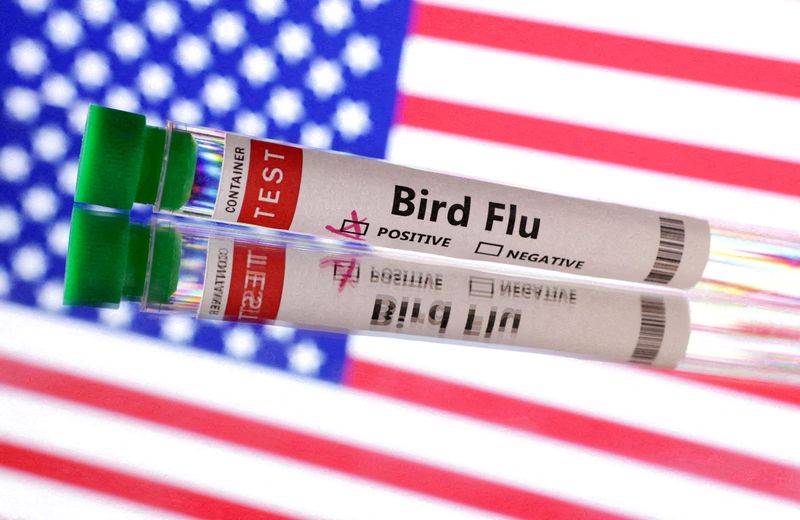By Leah Douglas and Tom Polansek
(Reuters) -The U.S. reported its first severe human case of bird flu on Wednesday in a Louisiana resident who is hospitalized in critical condition after suspected contact with an infected backyard flock.
California, the most populous state, declared an emergency over the H5N1 virus as it spread more widely in dairy herds and after it has infected dozens of farm workers this year.
Federal and state officials have failed to control the nation's outbreak, which infected dairy cattle for the first time in 2024, as some farmers resist testing and containment measures.
Severe respiratory illness in the Louisiana patient shows increased health risks for people from the virus that previously caused eye redness, or conjunctivitis, in infected dairy workers.
Bird flu still represents a low risk to the general public, the U.S. Centers for Disease Control and Prevention said.
CDC has confirmed 61 human cases nationally since April, mostly in workers on dairy farms where the virus infected cattle. Workers culling infected poultry also have tested positive.
The patient in Louisiana is suffering severe respiratory illness, the Louisiana Department of Health said in a statement. The person is reported to have underlying medical conditions and is over the age of 65, the department said, putting the patient at higher risk.
The case is the first to be linked to backyard, non-commercial poultry, said Demetre Daskalakis, director of CDC's National Center for Immunization and Respiratory Diseases, on a call with reporters.
The CDC said a sporadic case of severe illness in a person with H5N1 bird flu is not unexpected as such cases have occurred in other countries in 2024 and prior years, including cases that led to death.
"The mild cases that we've seen in the United States largely reflect that many of the individuals are getting infected by dairy cows and that's very different than getting infected with infected birds," said Amesh Adalja, a senior scholar at Johns Hopkins Center for Health Security.
"If you look at the genotype of this patient in Louisiana, it wasn't the cattle strain. It was a wild bird strain."
CDC said partial viral genome data from the infected patient shows that the virus belongs to the D1.1 genotype, recently detected in wild birds and poultry in the United States and in recent human cases in British Columbia, Canada, and Washington state.
This genotype of the virus is different from the B3.13 genotype detected in dairy cows, human cases in multiple states, and some poultry outbreaks in the country, CDC said.
Bird flu has infected more than 860 dairy herds in 16 states since March and killed 123 million poultry since the outbreak began in 2022.
In California, the top U.S. milk-producing state, 649 herds have tested positive since late August, roughly 60% of its herds, according to U.S. data.
Four southern California dairies tested positive on Dec. 12, "necessitating a shift from regional containment to statewide monitoring and response," California Governor Gavin Newsom said in his emergency declaration. Earlier cases had been centered in the Central Valley (NASDAQ:CVCY) in the middle of the state.

The declaration aims to streamline and expedite California's response by allowing more flexibility for staffing, contracting and other rules, Newsom said.
The U.S. Department of Agriculture said it has enrolled 13 states in a newly launched national bulk milk bird flu testing plan, representing nearly half of the nation’s milk supply.